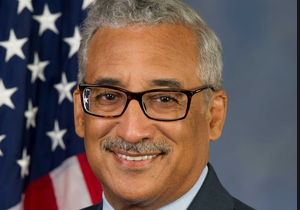Bad Math: Subtracting Equity from Education Equals Diminished Returns
 Rep. Bobby Scott
Rep. Bobby Scott
United States Congress
3rd Congressional District, Virginia
African-American students are graduating high school and enrolling in college at higher rates than ever before, but despite much progress, the right to equal educational opportunity remains a struggle. Access to public education may have come a long way since the dark eras of slavery or the segregation of Jim Crow, but too many African-American students still attend underfunded public schools segregated by race and class, effectively denying them equal educational opportunity and the chance to succeed in college and career. In 1954, the Supreme Court, in the Brown v. Board of Education decision, found that,
“…it is doubtful that any child may reasonably be expected to succeed in life if he is denied the opportunity of an education. Such an opportunity, where the state has undertaken to provide it, is a right which must be made available to all on equal terms.”
Civil rights leaders, Congressional Black Caucus (CBC) members, and community leaders have pushed tirelessly to enact local, state, and federal laws in pursuit of fulfilling the promise of Brown. After leading a coalition to successfully block attempts to send federal funding to racially segregated schools, Congressman Adam Clayton Powell, Jr., as Chair of the House Education and Labor Committee, advanced federal civil rights laws as part of President Lyndon Johnson’s War on Poverty. One of those laws, the Elementary and Secondary Education Act of 1965, sought to mitigate the negative impact of poverty on educational opportunity by sending federal dollars through Title I to areas of concentrated poverty, where tax revenue to support public education is low. Upon enactment, Chairman Powell said the ESEA would “give our most sincere and dedicated attention to the masses of our American youth whose futures are bright with promise.”
Through multiple reauthorizations over the following decades, many CBC members led efforts to amend the ESEA to serve disadvantaged students in an effort to reach equality of educational opportunity. CBC leaders fought for federal funding for English language acquisition and improved programming in urban school districts. Congress again reauthorized the ESEA in 2001 through enactment of the No Child Left Behind Act (NCLB). NCLB recognized that money alone was insufficient to improve educational equity. Under NCLB, states were required to measure—and more importantly, to act—to close achievement gaps. And while the transparency and actions of NCLB were the right idea, lack of funding and federal micromanagement of strategies to improve student outcomes led Congress to reauthorize the ESEA again in 2015 through enactment of the Every Student Succeeds Act (ESSA).
As the lead House Democrat on ESSA, I was proud to work alongside the National Urban League and other crucial civil rights partners to ensure high standards and other meaningful federal protections for Black students in the new law. ESSA provides flexibility to states, but also maintains the federal oversight and enforcement role to ensure they comply with the law and take meaningful action to close achievement gaps, improve resource equity, and better serve all students. I believe that if implemented and enforced the way Congress intended, ESSA will improve access to high-quality, equitable education for all students and will uphold the civil rights legacy of the law.
That means the Trump administration and Congress must commit to not only enforcing the law’s requirements, but also funding ESSA. The early actions of President Trump and Education Secretary Betsy DeVos are concerning. So far, these include blocking implementation of President Obama’s rules for ESSA’s core requirements and President Trump’s budget proposal. President Trump wants to cut 13.5% from the Department of Education’s budget and slash investments in public schools, while diverting dollars to private school voucher schemes. Despite claims that vouchers help disadvantaged students, research consistently shows that vouchers drain education budgets, don’t cover the full cost of tuition, and fail to produce better academic results for students. This leaves even less money to support the 90% of students across the country who are enrolled in public schools. The most recent data from Louisiana and Ohio shows that voucher programs actually have a negative impact on student achievement. Furthermore, private schools receiving vouchers are not accountable for student performance and discipline practices, and are not always subject to federal civil rights laws.
The Trump budget would eliminate or reduce funding for more than 20 additional education programs, including afterschool and teacher professional development programs. The budget would cut TRIO and GEAR UP, programs that support low-income and first-generation college students. The budget would also cut the Pell Grant program and drastically reduce campus-based aid. Cuts to student aid disproportionately affect African Americans as three out of five Black undergraduate students receive Pell Grants. President Trump’s draconian cuts would weaken the educational pipeline to college and future careers for the African-American community.
Thanks to the ESEA and the federal government’s oversight and enforcement role in education, Black student achievement has steadily increased. Now is the time to build on the progress we’ve made—not retreat from it. The Trump administration’s actions threaten that progress. The repeal of the ESSA rules, coupled with the president’s proposed budget, will put equity of educational opportunity further out of reach for too many African-American students. I encourage all of you—every parent, family member, teacher, administrator, civil rights advocate, and student—to fight against the harmful policies of President Trump and Secretary DeVos and make your voices heard in the fight for educational equity.


 Equality Index
Equality Index  Senate Report
Senate Report  2020 SOBA Essays
2020 SOBA Essays  2019 Report
2019 Report 